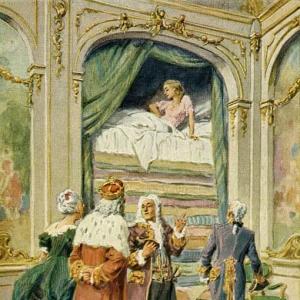Reading time: 10 min
A disbanded soldier had nothing to live on, and did not know how to get on. So he went out into the forest and when he had walked for a short time, he met a little man who was, however, the Devil. The little man said to him, „What ails you, you seem so very sorrowful?“ Then the soldier said, „I am hungry, but have no money.“ The Devil said, „If you will hire yourself to me, and be my serving-man, you shall have enough for all your life? You shall serve me for seven years, and after that you shall again be free. But one thing I must tell you, and that is, you must not wash, comb, or trim yourself, or cut your hair or nails, or wipe the water from your eyes.“ The soldier said, „All right, if there is no help for it,“ and went off with the little man, who straightway led him down into hell. Then he told him what he had to do. He was to poke the fire under the kettles wherein the hell-broth was stewing, keep the house clean, drive all the sweepings behind the doors, and see that everything was in order, but if he once peeped into the kettles, it would go ill with him. The soldier said, „Good, I will take care.“ And then the old Devil went out again on his wanderings, and the soldier entered upon his new duties, made the fire, and swept the dirt well behind the doors, just as he had been bidden. When the old Devil came back again, he looked to see if all had been done, appeared satisfied, and went forth a second time. The soldier now took a good look on every side. The kettles were standing all round hell with a mighty fire below them, and inside they were boiling and sputtering. He would have given anything to look inside them, if the Devil had not so particularly forbidden him: at last, he could no longer restrain himself, slightly raised the lid of the first kettle, and peeped in, and there he saw his former corporal shut in. „Aha, old bird!“ said he, „Do I meet you here? You once had me in your power, now I have you,“ and he quickly let the lid fall, poked the fire, and added a fresh log. After that, he went to the second kettle, raised its lid also a little, and peeped in. His former ensign was in that. „Aha, old bird, so I find you here! You once had me in your power, now I have you.“ He closed the lid again, and fetched yet another log to make it really hot. Then he wanted to see who might be sitting up in the third kettle it was actually be but a general. „Aha, old bird, do I meet you here? Once you had me in your power, now I have you.“ And he fetched the bellows and made hell-fire blaze right under him. So he did his work seven years in hell, did not wash, comb, or trim himself, or cut his hair or nails, or wash the water out of his eyes, and the seven years seemed so short to him that he thought he had only been half a year. Now when the time had fully gone by, the Devil came and said, „Well Hans, what have you done?“ – „I poked the fire under the kettles, and I have swept all the dirt well behind the doors.“ – „But you have peeped into the kettles as well. It is lucky for you that you added fresh logs to them, or else your life would have been forfeited. Now that your time is up, will you go home again?“ – „Yes,“ said the soldier, „I should very much like to see what my father is doing at home.“ The Devil said, „In order that you may receive the wages you have earned, go and fill your knapsack full of the sweepings, and take it home with you. You must also go unwashed and uncombed, with long hair on your head and beard, and with uncut nails and dim eyes, and when you are asked whence you come, you must say, ‚From hell,‘ and when you are asked who you are, you are to say, ‚The Devil’s sooty brother, and my King as well.'“ The soldier held his peace, and did as the Devil bade him, but he was not at all satisfied with his wages.
Then as soon as he was up in the forest again, he took his knapsack from his back, to empty it, but on opening it, the sweepings had become pure gold. „I should never have expected that,“ said he, and was well pleased, and entered the town. The landlord was standing in front of the inn, and when he saw the soldier approaching, he was terrified, because Hans looked so horrible, worse than a scare-crow. He called to him and asked, „Whence comest thou?“ – „From hell.“ – „Who art thou?“ – „The Devil’s sooty brother, and my King as well.“ Then the host would not let him enter, but when Hans showed him the gold, he came and unlatched the door himself. Hans then ordered the best room and attendance, ate, and drank his fill, but neither washed nor combed himself as the Devil had bidden him, and at last lay down to sleep. But the knapsack full of gold remained before the eyes of the landlord, and left him no peace, and during the night he crept in and stole it away.
Next morning, however, when Hans got up and wanted to pay the landlord and travel further, behold his knapsack was gone! But he soon composed himself and thought, „Thou hast been unfortunate from no fault of thine own,“ and straightway went back again to hell, complained of his misfortune to the old Devil, and begged for his help. The Devil said, „Seat yourself, I will wash, comb, and trim you, cut your hair and nails, and wash your eyes for you,“ and when he had done with him, he gave him the knapsack back again full of sweepings, and said, „Go and tell the landlord that he must return you your money, or else I will come and fetch him, and he shall poke the fire in your place.“ Hans went up and said to the landlord, „Thou hast stolen my money. If thou dost not return it, thou shalt go down to hell in my place, and wilt look as horrible as I.“ Then the landlord gave him the money, and more besides, only begging him to keep it secret, and Hans was now a rich man.
He set out on his way home to his father, bought himself a shabby smock-frock to wear, and strolled about making music, for he had learned to do that while he was with the Devil in hell. There was however, an old King in that country, before whom he had to play, and the King was so delighted with his playing, that he promised him his eldest daughter in marriage. But when she heard that she was to be married to a common fellow in a smock-frock, she said, „Rather than do that, I would go into the deepest water.“ Then the King gave him the youngest, who was quite willing to do it to please her father, and thus the Devil’s sooty brother got the King’s daughter, and when the aged King died, the whole kingdom likewise.
 Learn languages. Double-tap on a word.Learn languages in context with Childstories.org and Deepl.com.
Learn languages. Double-tap on a word.Learn languages in context with Childstories.org and Deepl.com.Backgrounds
Interpretations
Adaptions
Summary
Linguistics
„The Devil’s Sooty Brother“ is a German fairy tale collected by the Brothers Grimm, who were Jacob and Wilhelm Grimm, as part of their famous anthology of German and European folktales titled „Kinder- und Hausmärchen“ (Children’s and Household Tales). This collection was first published in 1812 and has since become one of the most influential and widely known compilations of folktales in the world.
The Brothers Grimm were linguists, cultural researchers, and authors who collected and published folktales as part of the broader German Romantic movement in the early 19th century. This movement aimed to celebrate national and cultural identity by preserving oral traditions, stories, and customs. The Grimm brothers‘ collection of tales includes stories from various sources, some being traditional tales passed down through generations, while others were contributed by their friends and acquaintances.
„The Devil’s Sooty Brother“ is an example of the „Deal with the Devil“ trope, a popular theme in European folktales where a character makes a pact with the Devil or another demonic figure in exchange for worldly gains, knowledge, or power. The consequences of these deals and the lessons learned often serve as the central theme of the story. In this particular tale, the protagonist, Hans, negotiates a deal with the Devil for sustenance and ultimately becomes wealthy and powerful as a result.
„The Devil’s Sooty Brother“ can be interpreted from various angles:
Consequences of breaking rules: Although Hans breaks the Devil’s rule by peeking into the kettles, he avoids punishment by taking action to rectify his disobedience. This could be interpreted as a lesson about acknowledging mistakes and fixing them to avoid worse consequences.
Ambiguity of good and evil: The story portrays the Devil as both a source of misery and a provider of opportunities. Despite trapping souls in hell, he helps Hans become rich and powerful. This moral ambiguity suggests that good and evil might not be as clear-cut as they seem, and that characters can possess both positive and negative traits.
Social class and appearances: Hans is initially judged by his appearance, especially when trying to rent a room at the inn and when the king’s eldest daughter refuses to marry him. His transformation from a soldier to a wealthy man highlights the impact of social status and wealth on people’s perceptions and treatment of others.
Personal growth and transformation: Hans undergoes a significant transformation throughout the story. He starts as a desperate soldier with nothing to live on, serves the Devil in hell, and eventually becomes a skilled musician and a king. The narrative can be seen as a tale of personal growth and self-improvement despite adversity.
Power dynamics and revenge: The story features a recurring theme of power dynamics, as Hans finds himself in a position to take revenge on his former superiors trapped in the kettles. The role reversal between Hans and his superiors demonstrates that the balance of power can shift unexpectedly.
The allure of wealth: The tale also touches on the theme of greed, as the landlord’s desire for gold leads him to steal from Hans. Hans’s newfound wealth, while granting him opportunities and respect, also reveals the darker side of human nature in others.
„The Devil’s Sooty Brother“ is a popular fairy tale that has been adapted in various forms of media. Here are a few notable adaptations:
Musical theater: In 1993, the German musical theater group „Cocolorus Budenzauber“ adapted „The Devil’s Sooty Brother“ into a musical called „Hans im Glück,“ which means „Hans in Luck.“ The show features original music and a contemporary twist on the story, with Hans traveling through time and encountering various historical figures.
Film: In 2013, the German filmmaker Max Lang directed an animated adaptation of „The Devil’s Sooty Brother“ called „The Sooty Brother.“ The film was produced by the BBC and features voice acting by prominent British actors such as Rob Brydon and Nina Conti.
Literature: „The Devil’s Sooty Brother“ has been adapted into various forms of literature, including picture books and retellings for young adults. One notable example is the 2015 novel „The Devil’s Sooty Brother: A Retelling of the Grimms‘ Fairy Tale“ by Neil Philip, which explores the story’s themes of greed and redemption in a modern context.
Music: The tale has inspired several musical works, including an opera by the German composer Siegfried Matthus called „Hans im Glück,“ which premiered in 2005. The story has also been referenced in various popular songs, such as the German folk song „Hans im Schnakenloch,“ which tells a similar tale of a man who gains wealth but ultimately loses his way.
Overall, „The Devil’s Sooty Brother“ has proven to be a versatile and enduring tale that continues to inspire adaptations and interpretations in various forms of media.
„The Devil’s Sooty Brother“ by Brothers Grimm tells the story of a disbanded soldier who makes a deal with the Devil to serve him for seven years in exchange for a lifetime of sustenance. The soldier, Hans, must not wash, comb, or trim himself, cut his hair or nails, or wipe water from his eyes during this time. He is taken to hell and instructed to tend the fire beneath the kettles, keep the place clean, and never peek into the kettles. Hans disobeys and looks into the kettles, finding his former superiors trapped inside, but escapes punishment by adding more logs to the fire.
After serving for seven years, which feels like half a year to Hans, he is released and given a knapsack filled with sooty sweepings, which turn into gold once he reaches the surface. He tries to rent a room at an inn, but the landlord initially refuses due to his filthy appearance. After seeing the gold, the landlord allows him to stay, but steals the knapsack overnight. Hans returns to the Devil for help, who cleans him up and refills the knapsack with sweepings. Hans confronts the landlord, who returns the stolen gold, making Hans wealthy.
On his way home, Hans learns to play music and catches the attention of a local king, who offers his eldest daughter in marriage. She refuses to marry a man dressed in a smock-frock, so Hans marries the youngest daughter instead. Eventually, Hans inherits the kingdom, and the Devil’s sooty brother becomes a king.
The fairy tale „The Devil’s Sooty Brother“ by the Brothers Grimm is a rich text for linguistic analysis, showcasing various elements typical of folklore and fairy tales.
Dialogue Use: Direct speech is prevalent, often used to convey agreements and commands succinctly. For instance, the Devil and the soldier’s initial conversation sets the plot in motion, with clear contractual language: „If you will hire yourself to me. . . “
– The repetitive structure in dialogue, such as the soldier’s encounters with the kettles—“Aha, old bird, so I find you here!“—serves both as a narrative device and a linguistic rhythm, which is a common feature in oral storytelling traditions.
Syntax and Diction: The language used is straightforward and paratactic, favoring simple sentences linked by conjunctions. This style mirrors oral storytelling, making it accessible and engaging for audiences of all ages. The diction reflects the time period and cultural setting, using older expressions like „whence comest thou?“ and formal titles like „the eldest daughter in marriage. “
Repetition and Formulaic Expressions: There is a formulaic quality in the tasks and commands given by the Devil: „You must not wash, comb, or trim yourself. . . “ This repetition underlines the magical rules of the tale, emphasizing the soldier’s transformation and the passage of time. The encounter with the kettles follows a repetitive and predictable pattern, enhancing the moralistic tone and underscoring the theme of poetic justice.
Characterization through Speech: The Devil’s speech is authoritative and contractual, highlighting his role as a tempter and gatekeeper of hell. The soldier, Hans, is characterized by his terse and resigned responses, conveying his desperation and later, his cunning. Indirect characterization is also evident through Hans’s actions, like enriching the fires under his former superiors, suggesting themes of revenge and reversal of power.
Symbolism and Metaphor: Hell serves as a metaphor for worldly struggles and the moral journey. The transformation of sweepings into gold symbolizes the theme of redemption and reward for endurance and cleverness, a common motif in fairy tales.
Themes and Morals: The narrative explores themes of transformation, redemption, and justice, encapsulated in Hans’s journey from destitution to royalty. Moral lessons are embedded within the narrative structure, such as the virtues of perseverance and the eventual triumph of the underdog.
Cultural Elements: The story draws on cultural beliefs in the devil and hell, framing them in a way that is both cautionary and entertaining. Royal marriages and social hierarchy are depicted, reflecting societal norms and values of the time, particularly the elevation of status through cleverness rather than birthright.
In summary, „The Devil’s Sooty Brother“ utilizes linguistic features typical of fairy tales—dialogue, repetition, and formulaic expressions—to weave a narrative rich in symbolism, cultural values, and moral lessons. Through these elements, the tale not only entertains but also imparts wisdom, embodying the enduring allure of Grimm’s folklore.
Information for scientific analysis
Fairy tale statistics | Value |
|---|---|
| Number | KHM 100 |
| Aarne-Thompson-Uther-Index | ATU Typ 475 |
| Translations | DE, EN, DA, ES, PT, IT, JA, NL, PL, RU, TR, VI, ZH |
| Readability Index by Björnsson | 31.3 |
| Flesch-Reading-Ease Index | 80.2 |
| Flesch–Kincaid Grade-Level | 7.5 |
| Gunning Fog Index | 10.2 |
| Coleman–Liau Index | 7 |
| SMOG Index | 8.4 |
| Automated Readability Index | 7.8 |
| Character Count | 6.489 |
| Letter Count | 4.931 |
| Sentence Count | 58 |
| Word Count | 1.271 |
| Average Words per Sentence | 21,91 |
| Words with more than 6 letters | 119 |
| Percentage of long words | 9.4% |
| Number of Syllables | 1.569 |
| Average Syllables per Word | 1,23 |
| Words with three Syllables | 46 |
| Percentage Words with three Syllables | 3.6% |

 Facebook
Facebook  Whatsapp
Whatsapp  Messenger
Messenger  Telegram
Telegram Reddit
Reddit













